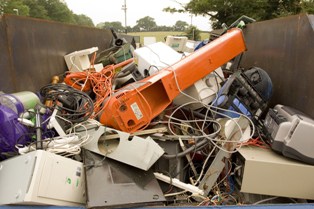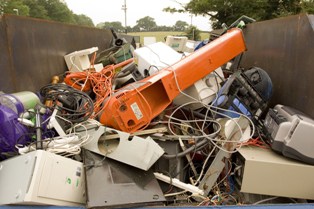The head of a producer compliance scheme specialising in non-household waste electrical and electronic equipment (WEEE) has defended the UKs business-to-business recycling rates, claiming that the figures do not reflect the reality of the situation.
Data published by the Environment Agency suggests that 5.4% of non household WEEE was recycled in 2011 (see letsrecycle.com story).
However, David Burton, project director at B2B Compliance, believes that many companies are recycling non-household electronic waste, but the vast majority of this does not enter the WEEE system.
Reuse
Speaking to letsrecycle.com Mr Burton explained that although the collection rate seems low, a significant proportion of waste electrical items are being recycled or reused.
He said: The definition of WEEE is waste electrical equipment, but on the business side it doesnt strictly become waste, it becomes used EEE. Generally, B2B WEEE is reused and sold on, one example would be medical equipment being sold to the developing world. That is why there appear to be very low collection rates.
If you have a piece of medical equipment worth hundreds of thousands of pounds, you wouldnt treat it in the same way as you would a standard DVD player that you would find in your home. When these items reach the end of their life, they still have many parts that work and can be stored as spare parts. What is left once these parts are taken couldnt be classed as WEEE and usually ends up going to the scrap yard.
This viewpoint would appear to be supported by the Waste & Resources Action Programme (WRAP) whose report on WEEE published in January 2012 suggested that large amounts of WEEE were being diverted from landfill through unofficial routes, particularly in the B2B sector, as businesses are actively involved in reusing electrical equipment (see letsrecycle.com story).
Mr Burton added: Without recognising the reality of the situation on the ground, before any consultation around the new regulations, we could end up with totally inappropriate legislation and unachievable targets for the non-household sector – we do need a reality check.
Guidelines
Concerns have also been raised by operators of compliance schemes and approved authorised treatment facilities (AATFs) that B2B WEEE is often being classed incorrectly as B2C WEEE because of a provision in existing WEEE rules.
Under current WEEE regulations, WEEE can be classified as WEEE from private households if it comes from a commercial, industrial, institutional or other source and if the nature and quantity of WEEE is similar to that derived from private households.The Environment Agency is set to issue new guidance later this month to clarify the decision making process that should be followed when choosing to whether to classify WEEE items as B2B or B2C.
A spokesman for the Agency told letsrecycle.com that the guidance is currently under development and will be issued later this month.







Subscribe for free